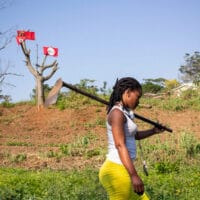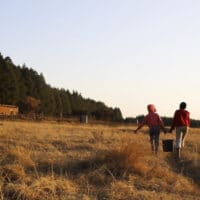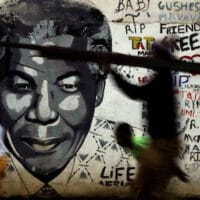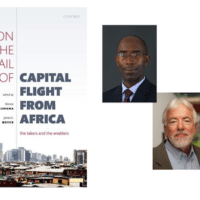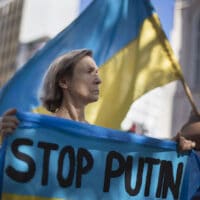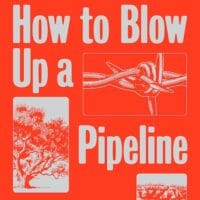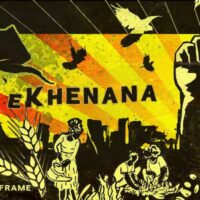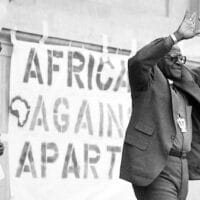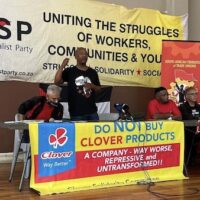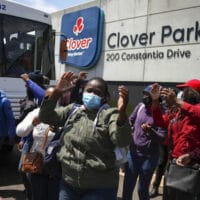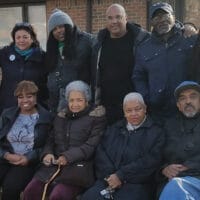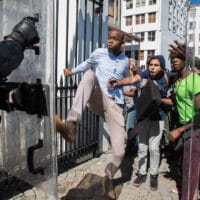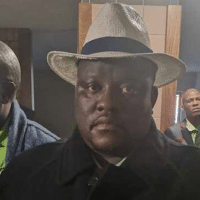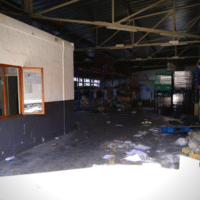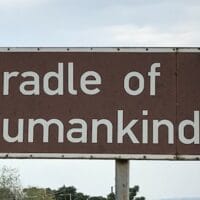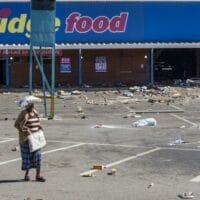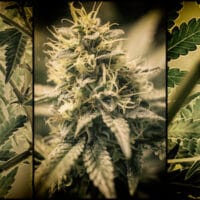-
Land in South Africa shall be shared among those who work it: The Twenty-Third Newsletter (2022)
In March 2022, United Nations (UN) Secretary-General António Guterres warned of a ‘hurricane of hunger’ due to the war in Ukraine. Forty-five developing countries, most of them on the African continent, he said, ‘import at least a third of their wheat from Ukraine or Russia, with 18 of those import[ing] at least 50 percent’.
-
Dossier no. 53: This land is the land of our ancestors
The labour relations on South African farms continue to maintain race, gender, and class inequalities as a central character of work and life.
-
My Nelson Mandela is dead
The Zionist campaign is vicious and relentless because they know that once a crack is made in their line of defense–a line that is made of deception, falsehoods and fabrication–they will fall, never to rise again.
-
Out of Africa: Rich continent, poor people
KUALA LUMPUR: Capital flight from the global South is immense, with widespread adverse effects. A new book proposes measures to curb, even reverse capital flight from Africa. It also offers pragmatic lessons for many developing countries.
-
International law and ‘European civilisation’
Despite its promises of universalism, international law has clearly not yet shaken its foundation as a racial order.
-
Andreas Malm ‘How to Blow Up a Pipeline: Learning to Fight in a World on Fire’
Despite its title, Andreas Malm’s recent book ‘How to Blow Up a Pipeline’ contains no concrete instructions on how to accomplish that particular deed.
-
A place of hope in a time of spiralling crisis
South Africa has many moments in its long history of struggle that are recognised internationally as turning points. These include the Sharpeville massacre in 1960, the Soweto uprising in 1976 and Nelson Mandela’s release from prison in 1990.
-
Deceased Nobel Peace Laureate Desmond Tutu Faces Zionist Reputational Firing Squad
Zionist organizations in the United States and around the world will continue to feel entitled to call anyone they wish a racist, a bigot, and an antisemite. Their successes empower them and, since there is no one who stands up to them, there is no reason for them to stop.
-
Unions allege petrol bombs, intimidation as strike intensifies at South African Dairy giant
Amid threats and intimidation, the workers’ action at Clover has been strengthened by worker solidarity as well as the increasing support of civil society for its boycott campaign.
-
South Africa: Clover workers call for nationalisation
Striking workers fear that corporate changes at the dairy giant will lead to reduced local production and increased imports of Israeli products.
-
#Africa4Palestine mourns the loss of Archbishop Tutu
PRESS STATEMENT: Africa4Palestine mourns the loss of Archbishop Desmond Tutu
-
On the road from Detroit to South Africa: Black radical internationalist traditions
Roy Singham reminisces about his work with the late General Gordon Baker, Jr. and the League of Revolutionary Black Workers (LRBW) in Detroit and its connections with South African workers.
-
Abahlali baseMjondolo Responds to ‘We Carry a New World in Our Riots’ by Siddiq Khan
Ours is essentially a tragic age, so we refuse to take it tragically. The cataclysm has happened, we are among the ruins, we start to build up new little habitats, to have new little hopes. It is rather hard work: there is no smooth road into the future: but we go round, or scramble over […]
-
We Carry a New World in Our Riots
July is mid–winter in the Southern Hemisphere, where Billie Holiday singing “like a summer with a thousand Julys” rings somewhat oddly. Just the same, there was plenty of fire to keep people warm this winter.
-
Assassins of South African trade unionist at large as labor dispute continues
Malibongwe Mdazo, an organizer of National Union of Metalworkers of South Africa, who had led a 7,000-worker strike last month, was publicly gunned down at the doorstep of Commission for Conciliation, Mediation and Arbitration, amidst a labor dispute on August 19.
-
Food supply to 675,000 people cut off after Durban food bank ransacked
FoodForward SA closes branches nationwide because of insecurity.
-
The other side of ecocide
The other side of ecocide thrives in the fertile ground of radical socioecological theory.
-
Food riots show the need for a basic income grant
As rioters target supermarkets, activists call on the government to help those who cannot survive amid rising prices and mass unemployment.
-
Battle over legality of cannabis grow clubs hits high court as cops clamp down on dagga lab
A battle by a business that ‘privately’ grew and prepared cannabis for clients, to have this service declared lawful, landed in the Western Cape high court this week–this as police clamped down on another dagga laboratory.
-
Global vaccine apartheid
A vaccine alone will not be enough to end the pandemic as it must also be made available at an affordable price and allocated in a way that achieves equity. It follows that suspending intellectual property rights related to COVID-19 is the most appropriate solution to our current situation of global vaccine apartheid.

